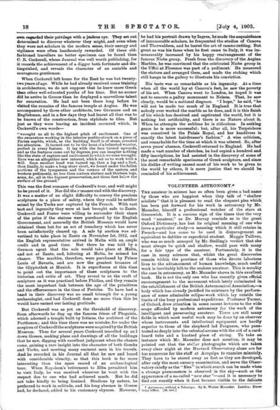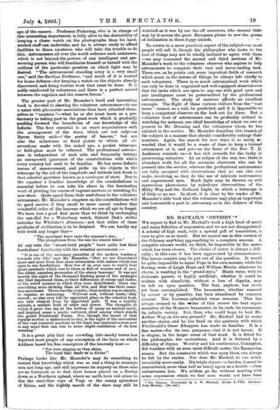VOLUNTEER ASTRONOMY.*
THE amateur in science has so often been given a bad name by those who are happiest when they talk of "shallow sciolists " that it is pleasant to read the eloquent plea which, has been put forward for his work in astronomy by Mr. Maunder, himself a professional watcher of the stars at Greenwich. It is a curious sign of the times that the very word "amateur," as Dr. Murray reminds us in the great Oxford Dictionary, has lost its original meaning of one who loves a particular study—a meaning which it still retains in French—and has come to be used in disparagement as equivalent to dabbler or superficial student. Maggie Tulliver, who was so much annoyed by Mr. Stelling's verdict that she must always be quick and shallow, would pass with many for a fair type of the amateur. Fortunately, it is the anae in many sciences that, whilst the great discoveries remain within the province of those who devote laborious lives to tha advancement of human knowledge, much useful work is inevitably left to the zealous amateur. This is notably' the case in astronomy, as Mr. Maunder shows in this excellent book. He is not the only one who has recently given official encouragement to the movement which lately culminated in the establishment of the British Astronomical Association,—a body which has already justified its existence by the perform- ance of some admirable eclipse-work which lay outside the limits of the busy professional expeditions. Professor Turner, of Oxford, drew attention in some recent lectures to the wide scope afforded by modern astronomy for the work of the intelligent and persevering amateur. There are still many fields in which most useful work may be done by an observer whose instruments and intellectual equipment are hardly superior to those of the shepherd lad Ferguson, who pene- trated so deeply into the celestial arcana with the aid of a card- board tube and a knotted piece of string. To take an instance which Mr. Maunder does not mention, it may be pointed out that the atel:ar photographs which are taken every clear night at the Harvard Observatory alone are far too numerous for the staff at Arequipa to examine minutely. They have to be stored away as fast as they are developed, after only the most cursory examination, and serve the Obser- vatory chiefly as the " files " in which search can be made when a strange phenomenon is observed in the sky—such as the appearance of a so-called "new star "—and it is necessary to find out exactly when it first became visible to the delicate • Astronomy without a Taloscoje. By E. Walter Maunder. London: KALIF Italia Office. L5e. uetl
eye of the camera. Professor Pickering, who is in charge of this interesting department, is fully alive to the desirability of keeping a closer watch on the photographs than his hard- , worked staff can undertake, and he is always ready to afford lacilitiea to those amateurs who will take the trouble to do ,this. Astronomers all over the world welcome such assistance, which is not beyond the powers of any intelligent and per- severing person who will familiarise himself or herself with the outlines of the particular question on which light may be desired. "The astronomical standing army is a very sinall one," said the Savilian Professor, "and much of it is wanted for home defence—for keeping a watch on the objects already discovered and doing routine work that must be done. It is nobly reinforced by volunteers, and there is a perfect accord I between the regulars and the reserve forces."
The greater part of Mr. Maunder's lucid and interesting book is devoted to showing the volunteer astronomer—to use a name with pleasanter associations than have attached them- .selves to "'amateur "—what he or she must learn as a pre- climinary to taking part in the great work which is gradually 'pushing forward the boundaries of our knowledge of the infinite. The first essential is an exact acquaintance with the arrangement of the stars, which are not only—as Byron finely said—" the poetry of heaven," but are also the milestones or fixed points to which all ob- servations made with the naked eye, a pocket telescope, or field-glass must be referred. The professional aatrono- men is independent of such aids, and frequently betrays an unexpected ignorance of the constellations with which every country lad used to be familiar. He has more definite means of measurement, and picks up his objects in the telescope by the aid of the longitude and latitude laid down in that celestial gazetteer known as a catalogue of stars. But to the amateur a familiar knowledge of the constellations is
essential before he can take his share in the fascinating work of plotting the course of vagrant meteors or watching for new'stars. Quite apart from their usefulness to the volunteer astronomer, Mr. Maunder's chapters on the constellations will do good service if they recall to more casual readers that wonderful order of the heavens which we are all apt to forget. We have lost a good deal more than we think by exchanging
the sun-dial for a Waterbury watch, Gabriel Oak's stellar calendar for Whitaker's Almanac,—not that either of these products of civilisation is to be despised. We can hardly say with truth any longer that— "The merchant bows unto the seaman's star, The ploughman from the sun his season takes."
At any rate, the "street-bred people" have quite lost their forefathers' familiarity with the celestial movements :—
" It is one of the necessary penalties of the modern tendency towards city life," says Mr. Maunder, "that we are dissociated more and more from that close intercourse with nature which was open to our forefathers. How few of us ever care to watch tbat great spectacle which was to them so full of wonder and of awe, the silent, ceaseless procession of the starry heavens! It was not merely the sight of the thousand Bashing gems of the midnight sky that impressed them, or their differences of colour and lustre, or the weird manner in which they were distributed ; there was something more striking than all this, and that was their cease- less movement. There was the wonder; that motion was so stately, so regular, so unceasing. Without rest, without haste,' they moved ; no star ever left its appointed place in the celestial host, nor ever strayed from its appointed path. It was a nightly miracle, a miracle both of order and power. The thoughts to which it gave rise lay at the bottom of many an ancient myth, and inspired many a poetic outburst, chief among which stands the grand Nineteenth Psalm. Nor, though the secret of that regular motion is understood to-day, is the sight of the movement of the vast cosmical machine in the least less impressive even now to any mind that can rise to some slight realisation of its true meaning."
It is a great pity that our crowding into smoky towns has
deprived most people of any conception of the facts on which Addison based his fine conception of the heavenly host :— " For ever singing as they shine, The hand that made us is divine."
Perhaps books like Mr. Maunder's may do something to restore that knowledge which was so real a thing to country.
men not long ago, and still impresses its majesty on those who are so fortunate as to find their homes placed on a Surrey down or a Northern upland, where no earth-born veil arises to dim the steel-blue rays of Vega or the sunny splendour of Sirius, and the nightly march of the stars may still be watched as it was by our far-off ancestors, who steered their way by it across the great European plains to sow the germs of civilisation in these foggy islands.
To return to a more practical aspect of the subject—as most people will call it, though the philosopher who looks to the root of things may not be wholly inclined to agree with them —we may commend the second and third sections of Mr. Maunder's work to the volunteer observer who aspires to help astronomers to complete their vast and never-ending task. There are, as he points out, some important fields of research which must, in the nature of things, be always left chiefly to such volunteers. There is so much astronomical work which can only be done in organised and well-equipped observatories that the tasks which are open to any one with good eyes and fair intelligence must be pretermitted by the professional astronomers. The study of meteors affords an excellent example. The flight of these curious visitors from the "vast inane" cannot, as a rule, be predicted, and it is iinpossible to keep a competent observer on the look cut for them. But a volunteer host of astronomers can be profitably utilised in watching for meteors, our chief knowledge of which we owe at present to Mr. Denning and the volunteers whom he us enlisted in the service. Mr. Maunder describes this branch, of the subject in a manner that should considerably enlarge their numbers. Again, the search for new stars is so rarely me- warded that it would be a waste of time to keep a trained astronomer at it, and yet—as the fame of the Rev. T. D. Anderson reminds us—it has rich rewards for the lucky or persevering volunteer. At an eclipse of the sun, too, there is abundant work for all the accurate observers who can be pressed into the service, whereas the professional astronomers are fully occupied with observations that no one else can make, involving as they do the use of intricate instruments and experienced eyes. Much light may be thrown on still mysterious phenomena by naked-eye observatiOns of the Milky Way and the Zodiacal Light, in which a, telescope is of little or no use. In short, it is clear to the reader of Mr. Maunder's able book that the volunteer may play as important and honourable a part in astronomy as in the defence of this country.











































 Previous page
Previous page